How Often to Change Gravel in Fish Tank Updated
How Often to Change Gravel in Fish Tank
You want to exist a good fishkeeper, you want your fish to be happy and healthy. So, naturally, you want to know how often yous should vacuum your aquarium gravel. After all, that's where your fish'due south poop settles. And yous wouldn't ignore poop in your cat'due south litter or your guinea hog'due south bedding.
It stands to reason that your fish should be the aforementioned? Near! The divergence betwixt your aquatic pets and your terrestrial pets is that your aquarium is more of an enclosed environment. Fish poop does break downwardly and is consumed by beneficial bacteria, snails, and detritus worms. Merely, simply considering that natural process takes places, doesn't mean you should ignore an excessive build up of fish poop and other detritus in your aquarium's gravel or substrate.
So, in this commodity we're going to talk most when yous should be using a gravel vacuum on your aquarium'due south substrate.
No Hard & Fast Rules!
When it comes to vacuuming your gravel—similar so many things in fishkeeping—at that place are no hard and fast rules.
Yous might have heard, "yous should clean your gravel once a week!"
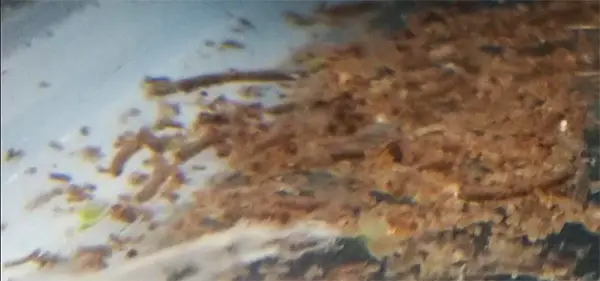
And while that might a straightforward rule to follow, it ignores all the variables at play. Information technology could very well exist that you tin get away with only vacuuming your gravel once a month. On the other hand, you might need to be vacuuming information technology every twenty-four hours!!!
Don't panic though, you don't need to be a sorcerer understand your aquarium. Below are the key variables y'all need to consider and the hard numbers y'all can measure in your aquarium to see know if there's a problem.
How Many Fish?
First matter you need to think well-nigh is: do you have a lot of fish in your tank. If your aquarium is loaded with fish, then that ways yous're feeding them more, then naturally they're producing a lot of waste material and if you don't vacuum the gravel frequently, information technology will build up.
Some Fish Are Messier Than Others
In addition to how many fish, what kind of fish do you have? This is important to consider considering no ii species of fish are the same. Some are merely inherently messier.
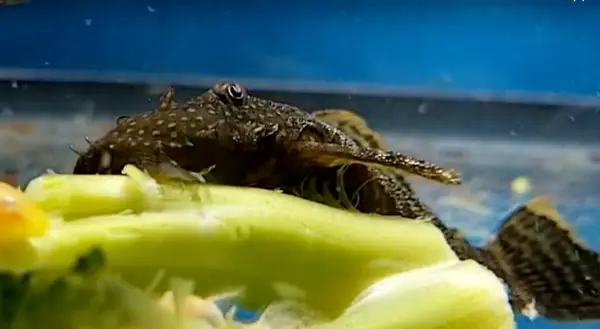
For example, plecos are known every bit "poop machines" for a good reason. Whereas, some large cichlids have this frustrating addiction of chewing upwards, spitting out, and chewing up again and over again. As y'all can imagine, this makes tons of mess! And we can't forget the world'due south favorites, goldfish—they swallow a agglomeration and poop a bunch!
Ability Filters & Catamenia
Poop falls downward to your substrate, correct? Not always! Where your fish's poop ends up depends on your pump. If y'all have a power filter, i.due east. a filter that has a motor, then in that location's a good hazard a large amount of the fish poop volition be sucked into the filter's intake.
A strong pump with a strong flow will suck up more detritus, whereas a weaker pump volition capture less. And air-driven filters—like sponge, box, and ziss filters—will not capture much solid waste at all.
Therefore, y'all must also consider the power of flow/suction your filter creates when trying to understand how often you lot need to vacuum your aquarium'due south gravel.
Ammonia, Nitrite, & Nitrate
The last piece of the puzzle is the (very basic) chemistry involved. Put only, fish pump out ammonia, while your aquarium'due south benign leaner converts that ammonia to nitrite and nitrate.

As fish waste breaks downwardly it produces more than ammonia. It's not something you can eliminate. Moreover, information technology's non really something you need to be aiming to eliminate. That'southward because your bacteria colony around your tank, and specially in your filter media, will be hungry plenty and happy enough to process that ammonia for you.
However, too much waste sitting in your substrate could somewhen outstrip your leaner colony'south chapters to process it.
It'south An Eyesore Anyhow!
Regardless of whether your bacteria population is big enough and stiff plenty to cope with an excess of fish poop, you notwithstanding might not want to let it build up.
This is mainly because fish poop will become an eyesore. First of all, as it breaks down into smaller pieces information technology gets lighter. Once it'southward lighter, it can offset to float effectually your aquarium. Additionally, if your gravel contains a lot of waste, moving rocks, plant, or other decorations becomes a problem; specifically, anything upsetting the gravel bed will result in an ugly deject of half decomposed feces clouding up your previously beautiful fish tank.
Plants
Plants can both help and hinder appropriately maintaining your substrate.
For instance, plants that like to root in the substrate—such equally Amazon swords or cryptocoryne species—will naturally consume your fish's waste matter in their search for fertilization.
Amazon swords volition devour so much fish poop and grow then big and so fast that their roots will before long spread throughout your substrate. This can be skillful, and information technology tin be "bad"—while widespread roots tin can notice more waste, they can also make it so yous won't be able to vacuum the substrate without uprooting the plant. However, I put "bad" in quotes because if yous're lucky enough to have rooted plants expand beyond the majority of your substrate you probably won't have much of a problem with waste build up anyhow.
Plants, like the beneficial bacteria in your aquarium, will help with your h2o chemistry. Non only volition plants attack the solid waste matter in your substrate, they will also eat the nitrogen compounds in your h2o (ammonia, nitrite, and nitrate).
Food!
The food y'all feed to your fish tin can also play a office in how often you should vacuum your aquarium's gravel.
It's not just the volume of food you lot provide, merely also the type of food.
Some commercial food breaks apart quickly and messily. And so, if you lot don't take substrate sifting fish in your aquarium—dojo loaches for instance—and so that errant food might stay, indefinitely, mixed in with your gravel bed.

And if you're like me, you might feed fresh foods similar vegetables, or frozen foods similar chopped mussels. These kind of foods, while adept for your fish, are extremely messy. Leftovers can chop-chop foul your tank'south h2o, especially in the case of meaty foods—therefore, it's all-time to make clean out uneaten veggies and protein from the aquarium post haste.
How Are Your Fish Looking?
So, we've covered a large list of things that can impact the build up of waste in your aquarium's bed of gravel, pebbles, or sand. Only how can we know when in that location's an unhealthy build upwardly?
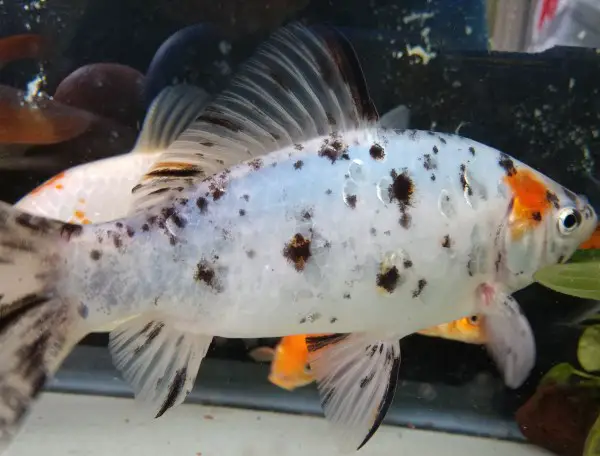
Well, a good indicator that there might be a problem in the aquarium is the fish themselves. Considering fish volition let you know if they're not feeling right: are they lethargic, are their fins clamped, are they generally acting out of the ordinary?
Buy A Test Kit!
I said in the introduction to this article that there were no difficult and fast rules about when to make clean your aquarium's substrate. Nonetheless, in that location are a couple of measurable exceptions!
Quickly put, an aquarium must be "cycled" in lodge to provide a healthy abode for fish. The cycle in question is the nitrogen wheel. Just explained, the nitrogen wheel involves beneficial bacteria consuming and processing ammonia, first, into nitrite, and so ultimately, into less harmful nitrate. A "cycled" aquarium, is an aquarium with a healthy colony of these beneficial bacteria.
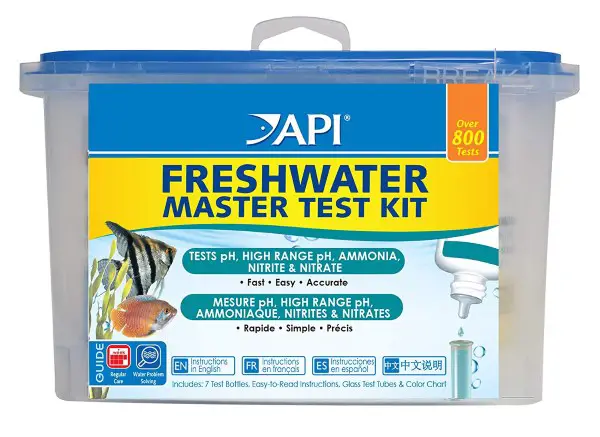
If you accept a mature aquarium, generally yous don't need to test for ammonia or nitrite very often. Simply, nevertheless, y'all should cheque periodically to make certain everything is tip summit, okey dokey, etc.
Should ammonia or nitrite exist present in a mature aquarium, and so this means your beneficial bacteria isn't keeping upwardly. This is quite rare, merely information technology can happen. In such a scenario, one of the outset things I would check would be my substrate—is information technology overloaded with detritus? If so, vacuum that gravel and exercise a couple of water changes and keep testing your aquarium h2o.
Snails & Detritus Worms Everywhere!
Another sign that there'due south an excess of detritus in your aquarium is an exploding population of snails, peculiarly MTS (Malaysian trumpet snails). Although, for their population to grow, they must exist present in the aquarium to begin with.
In addition to snail, y'all might start to run across minor, white, wriggly worms in your aquarium. A lot of fishkeepers panic when they first run across these, but ix/x times they are harmless detritus worms. Detritus worms, as the name indicates, exist by consuming detritus. So, naturally, if your gravel has an excess of waste, then you might start to see more and more detritus worms.
What Is A Gravel Vacuum Anyway?
Nosotros call them gravel vacs to draw a comparison with our household vacuum cleaners. Manifestly there is no vacuum involved with your gravel vac. Rather, it creates a siphon which volition drain the h2o out of your aquarium and downwards into a bucket, a drain, or maybe right onto a flowerbed in your backyard!
Use A Expert Gravel Vac!
Personally, I like Aqueon'south gravel vacuums considering they come with a handy squeezable bulb that starts the siphon. Additionally, the Aqueon product comes with a handy zipper to hold the waste matter hose to the rim of a bucket. The attachment helps eliminate spillages!
Conclusion
If you're a newcomer to the aquarium hobby I could see how you lot might have a smidgen of anxiety nigh the cleanliness of your substrate. My advice to yous is to avert worrying. Just keep an eye on your fish and an eye on your substrate, i.e. be mindful! If you doubtable a trouble, address it.
I appreciate that some will tell you to "vacuum your gravel once a week" and while that would probably be plenty for most tanks, it might not be—that'southward why we've looked at the variables, to help requite a better base from which to understand your aquarium.
With time, experience volition come and somewhen yous'll just "get a feel for it."
Farther Reading
How Often to Change Gravel in Fish Tank
Posted by: phillipsolkill.blogspot.com
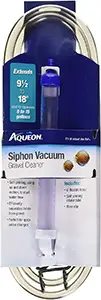

0 Response to "How Often to Change Gravel in Fish Tank Updated"
Post a Comment